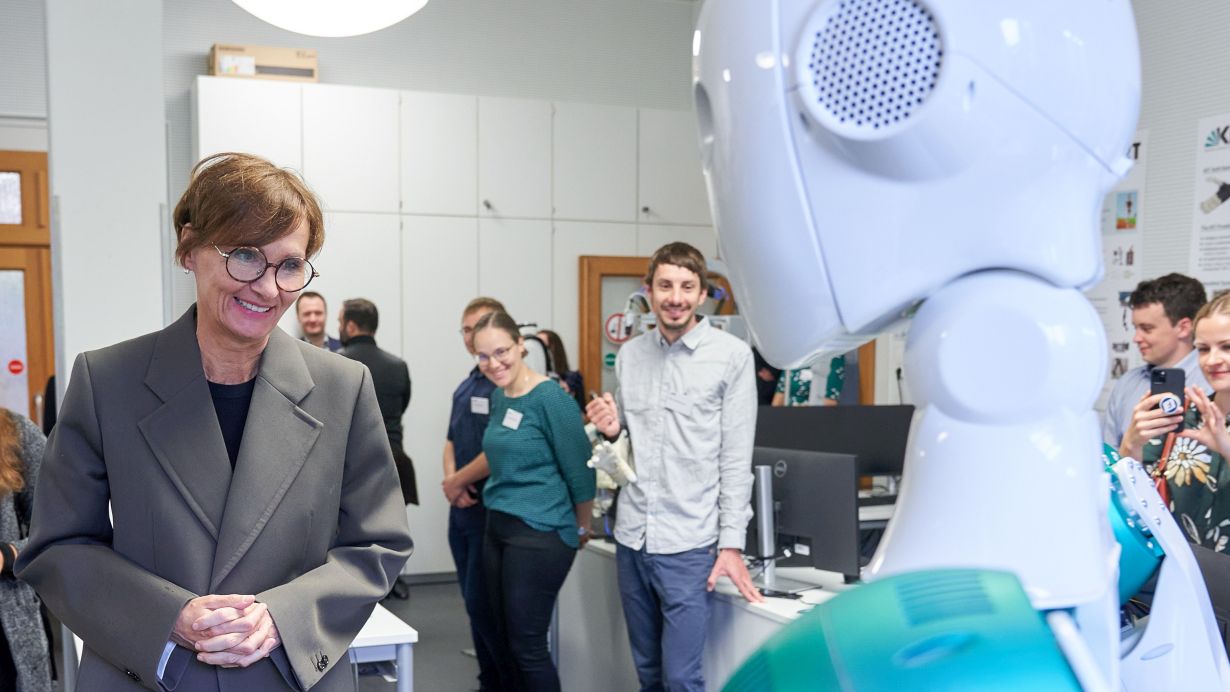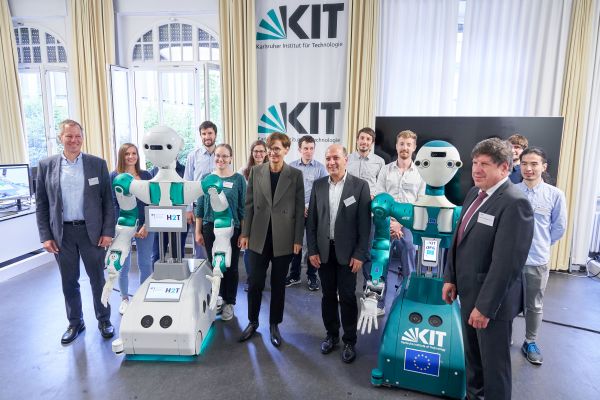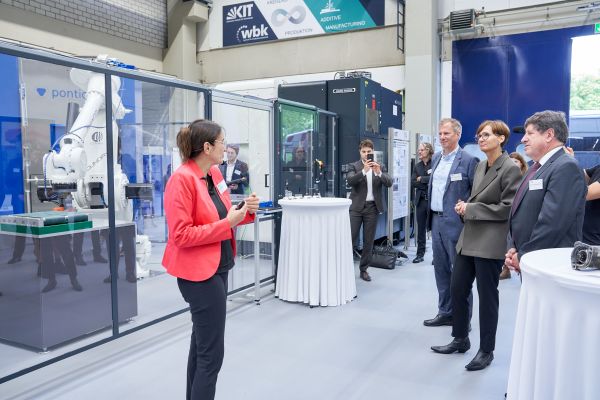
Intelligent robot technologies and systems that support humans in executing various tasks and methods based on artificial intelligence (AI) to bring spent products back into a sustainable cycle. These are two examples of activities pursued by researchers of Karlsruhe Institute of Technology (KIT). Today (July 28, 2023), Federal Research Minister Bettina Stark-Watzinger visited KIT and informed herself about the current state of research in these areas.
The Federal Research Minister visited laboratories and research facilities at KIT's Institute for Anthropomatics and Robotics (IAR) and wbk Institute of Production Science.
"AI is a key technology associated with great opportunities for our economy and society and robotics is the premium class of AI. The big challenge is to integrate AI in robotic systems in a quick, cost-efficient, and ethical way. This is where we grant funding to transfer robotic systems to complex applications. KIT makes an important contribution in this respect," says Federal Research Minister Bettina Stark-Watzinger.
"AI methods open up big opportunities. At KIT, we use them in humanoid robotics and for industrial production, among others. The goal is to support humans in direct interaction," says Professor Oliver Kraft, Vice President Research of KIT. "We are well aware of our responsibility for the people. We reflect on potential risks and study ethical aspects of artificial intelligence and the use of robots in private surroundings."
"When talking about AI and potential applications, we always have to consider the perspective of the people who use these systems and technologies. At KIT, we pay particular attention to dialog with the society," says Professor Thomas Hirth, KIT Vice President Transfer and International Affairs. "An example is the Robotic AI Real-world Lab, in which we conduct research in real environments and in dialog with users."
Technology for the People: Humanoid Robotics

ARMAR family to the Federal Research Minister (center).
Professor Oliver Kraft, KIT Vice President Research (left), and Professor Thomas Hirth,
KIT Vice President Transfer and International Affairs (right), accompanied the Minister to
stations of AI research. (Photo: Amadeus Bramsiepe, KIT)
Methods of robotic AI are among the central research issues studied by Tamim Asfour, Professor for High-performance Humanoid Technologies (H2T) at IAR. He wants to develop human-centered humanoid robots and assistive technologies to improve the people's quality of life. Together with his team, he studies and develops smart robot technologies and systems that can execute tasks in households and industrial environments. The humanoid ARMAR robots learn from observing humans, from interaction in natural language, and from own experience. The humanoid robots ARMAR-3 and ARMAR-6, for example, can support people in executing routine tasks in the kitchen or maintenance work at industrial facilities. Based on AI methods, the robots can assess when people require help and offer it proactively. Apart from the ARMAR robot family, the researchers develop portable, assistive technologies, such as personalized, smart hand prostheses and exoskeletons.
Sustainable Production: Close-loop Factory for the "Everlasting Product"

developed by wbk to the Federal Research Minister (on the right, with Professor Oliver Kraft
and Professor Thomas Hirth). Work is aimed at bringing spent products back into a sustainable cycle
(Photo: Amadeus Bramsiepe, KIT)
At the close-loop factory of KIT's wbk Institute of Production Science, researchers disassemble spent products, reprocess them, and use them again in the original or a later product generation. So far, these process steps have been associated with a high manual expenditure. Professor Gisela Lanza, Head of wbk, studies sustainable circular production patterns designed with AI methods. With her colleagues, she captures cognitive processes, such as eye movements of persons in problem recognition and solution and transfers them to automatable processes using machine learning methods. Work is aimed at bringing spent products back into a sustainable cycle to realize the vision of an "everlasting product." Scientific work extends from production technology and product development to materials technology and work science to robotics, computer science, and knowledge modeling.
Being "The Research University in the Helmholtz Association", KIT creates and imparts knowledge for the society and the environment. It is the objective to make significant contributions to the global challenges in the fields of energy, mobility, and information. For this, about 9,800 employees cooperate in a broad range of disciplines in natural sciences, engineering sciences, economics, and the humanities and social sciences. KIT prepares its 22,300 students for responsible tasks in society, industry, and science by offering research-based study programs. Innovation efforts at KIT build a bridge between important scientific findings and their application for the benefit of society, economic prosperity, and the preservation of our natural basis of life. KIT is one of the German universities of excellence.






